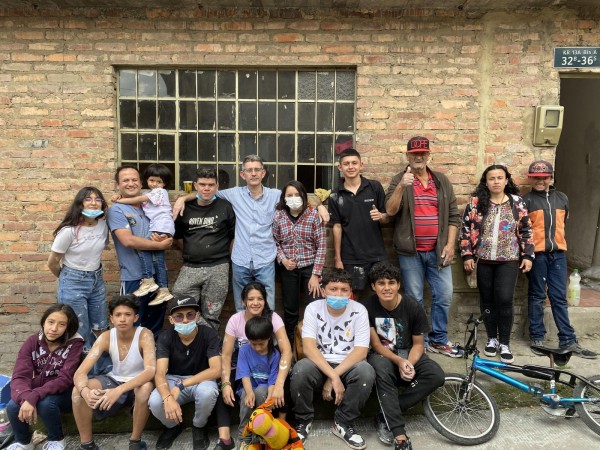We continue with our commentary on the Beatitudes of the Gospel of Matthew, which we started a few weeks ago. Today we take a look at the second one, which continues to stress the paradoxical nature of Jesus’ path to happiness.
Statue of Fray Antonio de Montesinos in Santo Domingo: he was
someone who allowed himself to be moved by the suffering of his brothers and sisters.
«Blessed are those who mourn, for they will be comforted» (Mt 5:4)
How should we understand this statement, which apparently is an absolute contradiction? How can suffering have the key to the door of happiness? How can the afflicted or those who cry be happy?
Here, too, it is necessary to begin by clarifying that it would be very possible to conduct an erroneous reading of the beatitude, according to which Jesus would be glorifying and praising suffering by itself. Someone could, indeed, use this verse to affirm that anguish and sorrow are good in themselves, and that, therefore, Christians must desire and proactively seek their torments. And it is not so: Jesus dedicated his life to alleviate the pain of others, curing the sick, feeding the hungry, restoring sight to the blind, and denouncing those who, with their selfishness, made the weakest suffer... Christianity is not a masochistic religion.
A second thing that Jesus is not saying in this beatitude is that it is necessary to suffer here, on this Earth, in order to be consoled in the afterlife. This does not agree with the spirit and the thinking of Jesus. To say something like, «look, you must agonize in this world, because then you will receive comfort in Heaven» would imply the image of a cruel God, who first needs to see our tears to then open the door to those who will have won their place in Heaven by enduring hardships. It cannot be so, when, first, Jesus never despised this present world (on the contrary, he affirmed that «the reign of God is already in your midst», in Lk 17:21) and, secondly, he said that his merciful Father is always eager to welcome us, to open wide the doors of his house, where there is room for everyone (Jn 14:2): Heaven is not «earned» on the basis of our many tribulations.
How are we, then, to understand this second beatitude? Perhaps in the sense that in this life only those who are not indifferent will be truly happy. That is, those who toil so that their hearts do not harden; those who keep alive their ability to be moved by someone else’s pain.
Certainly, if your heart is made of stone, you do not suffer, nor do you ever cry. But your life is, then, inhuman, and empty. It is much better to experience sorrow and to mourn because you have a human heart—which is moved by the pain of your brothers and sisters―than to live protected by an armor of indifference that, yes, prevents you from suffering, but also stops you from feeling love.
Those who mourn are those who walk around the world without an armor, with empathy towards their neighbors. In the end, this ability to cry with those who cry will give us the certainty—and the comfort— to know that we did not waste our lives, and this will surely bring joy into our hearts.
In this second beatitude Jesus warns us against apathy. This warning is more necessary than ever, because today, overwhelmed as we are by a constant flood of news, which is often very tragic, it would be easy to fall into insensitivity. We read or hear that a jealous husband killed his wife, that once again a group of immigrants died in the desert trying to cross the border, that there have been more innocent deaths in the Ukraine, in Yemen or in the Congo, that Haiti has been devastated by another storm, that in Iran they have executed someone who cried for freedom or that in Uganda someone has been imprisoned simply because he is gay—and we shrug our shoulders, without giving much importance to what we have just read or heard, and we quietly continue to sip our morning coffee, thinking already about something else. That is an unhappy life.
In the coming weeks and months, we will be publishing short entries on this blog commenting, one by one, the Beatitudes of the Gospel of Matthew. We will do it without any attempt of erudition or academic scholarship—simply reacting carefully to what Jesus proposes, trying to apply it to our daily lives.
Preface
The Beatitudes from the Gospel of Matthew (Mt 5:1-12) are a fundamental text of the Christian faith, as well as one of the most beautiful pages of the New Testament. In them, Jesus masterfully summarizes his lifestyle, the lifestyle that he invites his followers to put into practice.
The first great virtue and merit of the Beatitudes is that, in them, Jesus avoids moral or moralistic language, and does not speak of the duty of his followers, of what they are obliged to carry out to be considered upright people. He does not prohibit anything either (in the line of the ten commandments of the Old Testament). The use of mandates and prohibitions would have turned the Beatitudes into a legalistic text, a new decalogue: perhaps useful and very wise, but not necessarily attractive or exciting. Instead of opting for the language of the law, Jesus describes his lifestyle, emphasizing what it ultimately is: a path to happiness. Happy are those who do what I am saying, he affirms. Happy. By framing his teaching in the context of joy, Jesus touches an intimate chord in everyone who listens to him. Because, who doesn’t want to be happy? Assuring that what he proposes is a journey towards joy, Jesus reaches every human being, of any age and culture, by appealing to one of the most universal desires that exist.
What then happens, of course, is that when we start reading, we find out that this path towards happiness is very paradoxical. We immediately realize that it is a surprising, daring program, far removed from the conventional formulas that we would instinctively think of if we were asked how to attain joy. Jesus’ proposal constitutes an alternative path to the one we usually imagine, from our categories and with our imagination, when we meditate on what is required to obtain happiness. This paradoxical character of Jesus’ proposal is already evident in the first beatitude.
"Happy are the poor in spirit, for theirs is the kingdom of heaven"
This is a statement that, if it is misunderstood, can lead to a dangerous demagogy: someone could use this first beatitude to praise and applaud material poverty, and could end up saying that poverty helps us become better people, and that to go hungry makes a person happy—something that any hungry person would deny without the slightest hesitation. No, Jesus (who, in line with all the Old Testament prophets, denounced economic inequality and the abuse of the poor by the wealthy and powerful) is not praising material poverty (because there is nothing praiseworthy in it).
What Jesus says, when he states that the poor in spirit will be happy, is, to begin with, that the first condition to obtain true joy is to acknowledge one’s need of other people: to be poor in one’s heart means to recognize that I need all that others, and God, give me. Thus, this first beatitude is fundamentally a serious warning against self-sufficiency. The arrogance of those who think that they are rich, in the sense that they do not need anything from anyone, is a sure path to bitterness, due to the simple fact that it is a lie: we all need others, and the sooner we recognize it, the better.
«For theirs is the kingdom of heaven.» Absolutely: only people who are aware of their fragility, their vulnerability, of needing the support, warmth, tenderness, consolation, company and friendship of others, will be able to live in the kingdom of God, the «place» where the values of the Gospel are to be found. The arrogant and self-important, the narcissist unable to recognize that other people can teach him something useful, those who see other people as a burden and not as richness, will not know how to live in a kingdom that is founded on fraternity.
In addition to this, the first beatitude has, indeed, an economic dimension. Because it is only logical to think that the poor in spirit are also those who have made a choice for a sober lifestyle. They have understood that, in this world, true wealth is to be found in others, and in the friendships that one can forge with them through life. Therefore, they have relativized the importance of all material treasures. They have understood that it is possible to live with less; they have grasped the danger of idolizing money. In consequence, they practice a healthy austerity, the responsible austerity of those who understand that the world’s resources are limited, and that, in our global village, the luxury of a few is paid with the misery of many.
Members of a youth group from La Resurrección Parish in Bogotá (Colombia),
after helping paint the house of a vulnerable family of their neighborhood during Holy Week, 2022.
The Beatitudes are one of the most beautiful pages of the Gospel. Brother Roger Schutz, founder of the ecumenical community of Taizé, in France, said that—together with the Our Father—we should consider them as the fundamental text of the Christian life. And we have two versions of the Beatitudes: those by Matthew (Mt 5:1-12), which are perhaps better known (the first that come to mind), and those by Luke (Lk 6:20- 26). We would like to focus on the latter, and on the differences with the Beatitudes of Matthew, and on the message that is hidden precisely in these differences.
To begin with, in Luke Jesus does not announce the Beatitudes from a mountain, as it happens in Matthew, but on a plain. This geographical location is significant: while Matthew wants to underline that the Master speaks from on high (the removed place where one arrives to meet God), in Luke Jesus pronounces the Beatitudes on the valley, the space where people live.
In Matthew, the first beatitude reads: «Blessed are the poor in spirit.» On the other hand, in Luke it will be «Blessed are the poor»: just the poor, the material poor. A few verses further down, Matthew will say that blessed are «those who hunger and thirst for righteousness.» Luke’s second beatitude will simply be «Blessed are the hungry.» Not those who hunger for righteousness, but those who hunger for bread.
Somehow, while Matthew underlines Jesus’ invitation to be people who have chosen to live simply and in austerity, who have become poor as a result of a personal decision, and who have a deep inner desire for justice in the world, Luke’s message is more social, less spiritual: blessed are the poor and the hungry, because God is on their side.
Both versions of the Beatitudes are important. Matthew’s, emphasizing interiority and our ultimate options, those we cultivate when we seek spaces of solitude and find God on the mountains of peace— and Luke’s version, emphasizing our social commitment, the one we assume in the valleys of the world, confronted with the reality of the material poverty suffered by so many (material poverty which is scandalous in a world where we could all live comfortably if wealth were not so poorly distributed).
In Luke the message is, with all clarity and energy, that God takes the side of the victims of this world: happy will be the poor, the hungry, those who cry, because they are God’s beloved.
And this implies, of course, a question: What about us? Do we always side with the victims, the oppressed and the humiliated, or, perhaps, in order not to create problems for ourselves, are we among those who remain silent in the face of injustice, or do we even join the group of those who only seek their own good?
In this same social line, the Beatitudes of Luke have something that those of Matthew do not have: they are accompanied by some warnings. «Woe to you!» To whom are these warnings addressed? To the rich, those who are satiated, those who laugh, those of whom everyone speaks well.
And what's wrong with laughing, or being satiated, or being talked about well? These are the attitudes that describe people who are complacent with their environment, who agree the state of the world as it is, and who therefore live carefree. Woe to those, in short, who adapt too much to their environment! And that is a very serious warning: in this world of ours, so pierced by injustice, feeling too comfortable (perhaps because things are already going well for me) is an act of evident selfishness.
One looks around and sees so much injustice, so much oppression, so many people working so hard for so little, and others working so little for so much, and so much abuse, so much violence, so much cruelty, so much indifference—that it is logical to conclude that no one should ever say, «Everything is great!» A Christian is a person who is aware that the world is not great, and therefore does not uncritically accommodate himself to it: on the contrary, he protests and works to build a more just society.
Let us make the Beatitudes our own: those of Matthew, more spiritual, that invite us to examine our ultimate, intimate choices about the kind of person we want to be. And Luke’s, more social, that encourage us to develop a greater social commitment with the poor and those who suffer.

“Blessed are the poor in spirit, for theirs is the kingdom of heaven.
Blessed are those who mourn, for they will be comforted.
Blessed are the meek, for they will inherit the earth.
Blessed are those who hunger and thirst for righteousness, for they will be filled.
Blessed are the merciful, for they will receive mercy.
Blessed are the pure in heart, for they will see God.
Blessed are the peacemakers, for they will be called children of God.
Blessed are those who are persecuted for righteousness’ sake, for theirs is the kingdom of heaven.” (Matthew 5:3-10)
These words of Jesus, so vividly engraved in the memory of his disciples that walked with him, and transmitted up to our times, have been considered by many as the essential text of the Christian message, its most correct synthesis, capable of challenging the life of any person and to gain relevance in the face of any challenge or historical situation.
Undoubtedly, the Beatitudes today acquire their full meaning again in the face of the situation of the pandemic that we are experiencing and is still unfolding before our eyes in an uncertain way, without us being able to know the future that is taking place, the famous "new normality” towards which we are heading globally and also locally and personally. In each of our realities we are witnessing so many heartbreaking situations of poverty, crying and despair... along with countless testimonies of mercy and commitment to the most vulnerable.
If we reread the words of Jesus carefully we will see that they are clearly grouped: the first four beatitudes speak of passive suffering (that of the poor, those who cry, those who suffer...) to which so many people are subjected today, trapped by the uncertainties in health, society and the economy. The following four also mention those who work to remedy that same suffering (the merciful, the clean-hearted, those who work for peace and justice ...). We see, therefore, that Jesus addresses both those who are overwhelmed and powerless in the face of present suffering, as well as those who have the possibility of facing it and committing themselves to a more just and equitable future.
The Beatitudes do not contain an empty promise of future comfort, nor an invitation to resignation in the face of present suffering. Rather, they are an active invitation to work to remedy the causes of human suffering, here and now, and in all historical circumstances, thus defining the true itinerary of the Christian life. The kingdom of heaven that they announce is already present among us, and it can and should be built with the commitment for peace and justice, from the mercy and the cleanliness of heart of those who know how to be moved to compassion in the presence of the brother or sister who cries of helplessness and rage in the face of the loss of a loved one, and it is going hungry for having been left without work and without means to support his family and to pay the rent.



